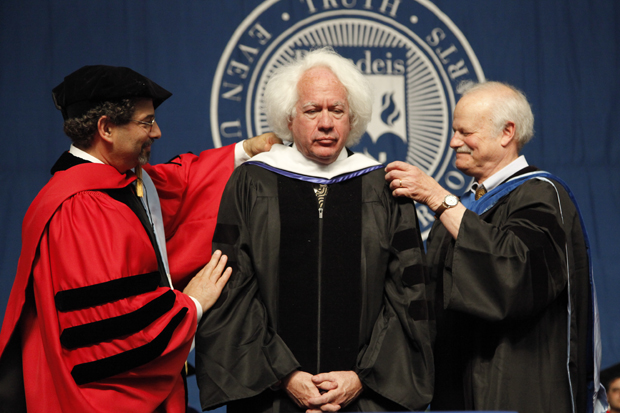We tell ourselves stories in order to live, sure, but what if we tell the wrong ones?
Yes, there’s always been a strain of madness in American society—in pretty much every society—but the sideshow was moved from the margins to the center ring in recent decades. The zealots, cranks and crooks have become the norm, or at least enough of the norm to tip the balance. Not that our country wasn’t sick before the Internet decentralized media. Donald Trump’s rise, which began before Reality TV and Russian bots, perfectly traces our descent into system-crushing corruption. Now numerous erstwhile pillars of our nation shudder and probably will fall. That will be messy, but it’s actually the best-case scenario: It’s still possible the fraudulent may consume whatever justice remains.
· · ·
In a Times Literary Supplement Q&A, fiction writer M. John Harrison argues that narratives, which are fast gaining a horrible reputation, will be extinct in a quarter of a century:
Question:
What will your field look like twenty-five years from now?
M. John Harrison:
Smaller. A generation will have grown up repelled by the urge to fantasy that lies behind fake news, corporate branding, political misdirection, sports reporting before the event, the constant fictionalization of everything. “Story” will be a dirty word, even at the BBC and in science journalism. Realism will have set in a long way upstream of the idea of fiction itself and people will be consuming their own lives, as lived, rather than images of life designed to persuade them of something. As part of the arms race between consumer and producer, they’ll have grown out of the idea that one kind of make-believe can be an antidote to another, and be trying to reduce their vulnerability to all of this stuff. A utopian picture, certainly: but utopianism and its ironical sister are traditional features of my field.
I’m sure that’s not so, nor do I think it should be. Democracy was a pretty good narrative and so was the Civil Rights Movement. Stories will always be with us, from the cave drawings of Chauvet-Pont-d’Arc until the extinction of our species, but we better choose them more carefully or that endgame will arrive sooner than we’d like.
· · ·
Pat Graham’s AP piece provides a portrait of a self-taught U.S. rocket scientist who believes the Earth is flat, which is a perfect metaphor for American exceptionalism run amok. The opening:
The countdown to launch creeps closer and there’s still plenty for self-taught rocket scientist “Mad” Mike Hughes to do: Last-second modifications to his vessel. Pick up his flight suit. Leave enough food for his four cats — just in case anything happens.
Hughes is a 61-year-old limo driver who’s spent the last few years building a steam-powered rocket out of salvage parts in his garage. His project has cost him $20,000, which includes Rust-Oleum paint to fancy it up and a motor home he bought on Craigslist that he converted into a ramp.
His first test of the rocket will also be the launch date — Saturday , when he straps into his homemade contraption and attempts to hurtle over the ghost town of Amboy, California. He will travel about a mile at a speed of roughly 500 mph.
“If you’re not scared to death, you’re an idiot,” Hughes said . “It’s scary as hell, but none of us are getting out of this world alive. I like to do extraordinary things that no one else can do, and no one in the history of mankind has designed, built and launched himself in his own rocket.
“I’m a walking reality show.”
The daredevil/limo driver has been called a little bit of everything over his career — eccentric, quirky, foolhardy. Doesn’t bother him. He believes what he believes, including that the Earth is flat. He knows this thought is a conundrum, given that he’s about to launch himself into the atmosphere.
Down the road, he’s intending to build a rocket that takes him to space, so he can snap a picture and see with his own eyes.
“I don’t believe in science,” said Hughes, whose main sponsor for the rocket is Research Flat Earth. “I know about aerodynamics and fluid dynamics and how things move through the air, about the certain size of rocket nozzles, and thrust. But that’s not science, that’s just a formula. There’s no difference between science and science fiction.”•
Tags: Mike Hughes, Pat Graham






